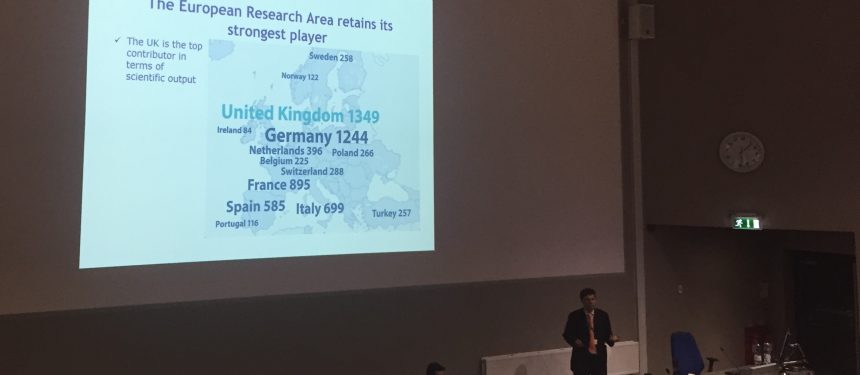UK university members of BUILA are liaising with counterparts in Europe to discuss a plan B to ensure the movement of students and staff can continue, should the outcome of Brexit negotiations negatively impact mobility ties.
News and business analysis for Professionals in International Education
Have some pie!
UK: BUILA fostering mobility plan B with Europe
 Thomas Ekman Jørgensen, senior policy coordinator at the EUA said the UK was not in the driving seat of Brexit negotiations and its only decision was ultimately to accept or reject the deal that the "machine" of Europe offers. Photo: The PIE News
Thomas Ekman Jørgensen, senior policy coordinator at the EUA said the UK was not in the driving seat of Brexit negotiations and its only decision was ultimately to accept or reject the deal that the "machine" of Europe offers. Photo: The PIE News Individual bilateral arrangements and partnerships could be an alternative scenario to the current multi-national system, explained Charlene Allen, chair of BUILA, the UK’s organisation of international liaison officers.
“Education was low down the list of priorities on the Brexit negotiation table,” she said, adding that research funding and being the destination of choice European students undertaking a mobility experience “are the issues international directors are concerned about”.
The agreements would come via institutions and organisations such as the European University Association, according to Allen.
“We need to prepare for bilateral arrangements and partnerships if multilateral systems are no longer available”
“The European institutions represented [at our conference] were suggesting that we prepare for bilateral arrangements and partnerships if multilateral systems are no longer available,” she said.
“They were keen for UK institutions to take a longer view in terms of balancing the flow of incoming and outgoing students.”
Communications in local European languages will be planned in the future and disseminated to European institutions via the EUA.
The EUA’s senior policy coordinator, Thomas Ekman Jørgensen, spoke at the conference on ‘what the UK’s European counterparts want’ from the UK.
He observed that the UK dominated scientific output within the European Research Area, and had the highest rates of student mobility within the EU in terms of inbound and outbound flows.
However, he warned that the UK was not in the driving seat of negotiations and its only decision on Brexit now was ultimately to accept or reject the deal that the “machine” of Europe was working on.
Representatives from Norway and Switzerland also shared with delegates their unique positions as EU stakeholders – but not members.
Vidar Pedersen from the Norwegian Centre for International Cooperation in Education (SIU) emphasised the importance to Norway of maintaining student mobility opportunities, inbound and outbound, noting that Norway paid a €350 million contribution to be a full participating member of Erasmus+.
Two thirds of the Norway’s Erasmus+ participants are incoming students, while one third leave on outbound exchanges. A white paper from January on quality of higher education has clear mobility goals, he added.
“EU institutions were keen for UK institutions to take a longer view on balancing the flow of students”
He continued on an upbeat note when talking further on Norway’s 1994 decision not to join the EU, voted by 52% of the public. With 75% of politicians keen to join, he said those governing the country “made the best of the situation”.
However, “not joining is not the same as leaving”, he added.
Sabine Pendl, vice-president of EAIE, also suggested a spirit of goodwill would endure. “Once you’ve lost something, it can have more value,” she noted.
And Joanna Williams, an academic and education editor of online current affairs magazine Spiked, struck a somewhat controversial tone for a conference full of Remain voters, by declaring she voted to leave the EU.
Williams challenged the notion, and any inference, that Leave voters are uninterested in Europe or ties with the continent or wider world and challenged universities to better reflect a representation of Leave voters, avoiding an assumption that they are all anti-migrant.
“Academics’ attitudes to leave-voters” had to be examined, she said, explaining she felt the issue of sovereignty trumped other positions.
Still looking? Find by category:


